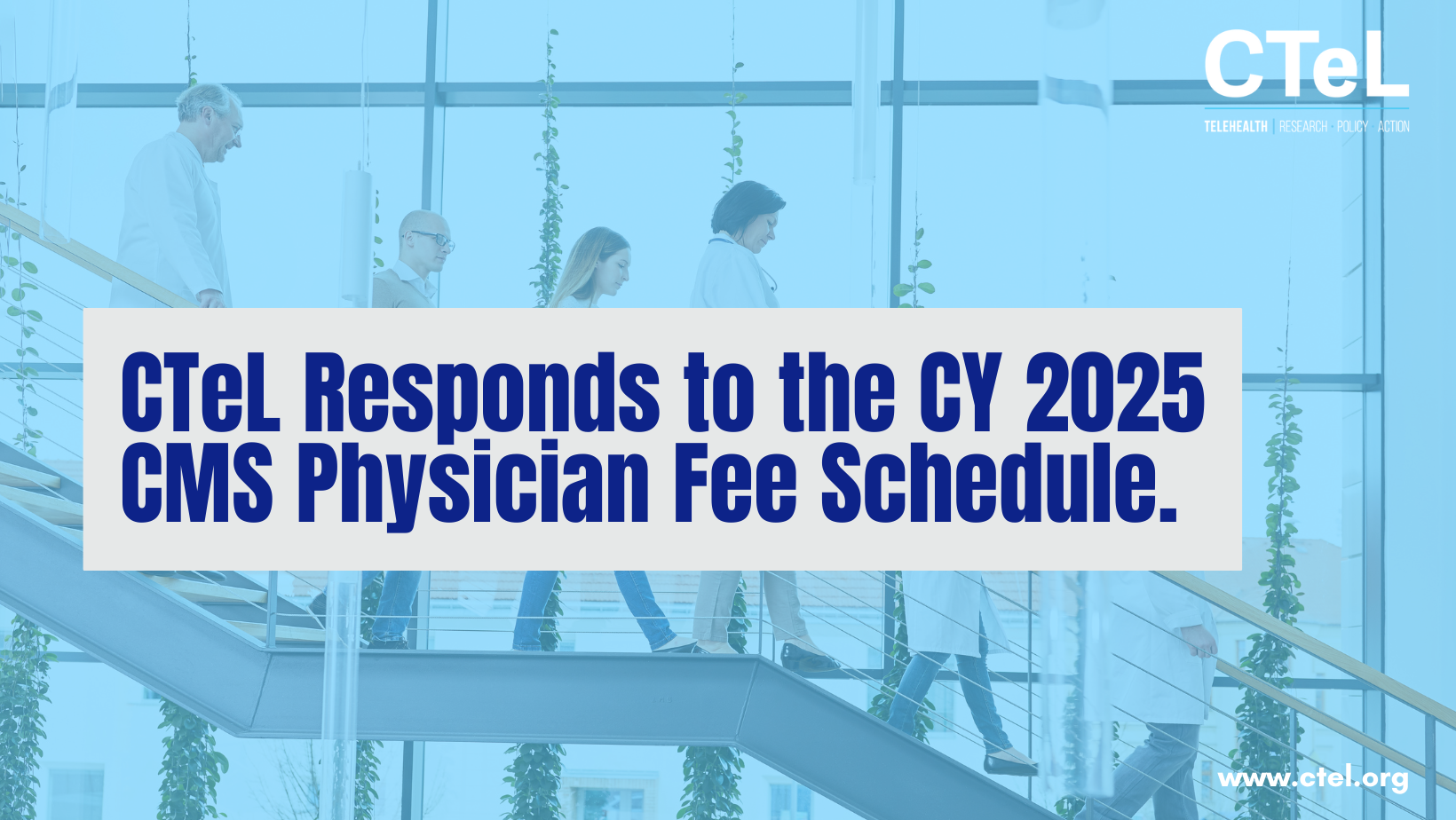CTeL Responds to the CY 2025 CMS Physician Fee Schedule
In response to the proposed CY 2025 Physician Fee Schedule from the Centers for Medicare and Medicaid Services (CMS), the Center for Telehealth and e-Health Law (CTeL) issued a comprehensive letter underscoring the importance of maintaining and expanding #telehealth provisions. The letter, addressed to CMS Administrator Chiquita Brooks-LaSure, focuses on ensuring that digital health services remain accessible, particularly for underserved populations, while addressing various proposed changes to Medicare payment policies.
CTeL, a non-profit research institute focused on the legal and regulatory dimensions of digital health, emphasized that telehealth is a critical tool in reducing healthcare disparities, lowering system costs, and improving health outcomes. The response reflects the views of both extensive research and feedback from healthcare providers on the frontlines.
Key Points from CTeL’s Response:
Conversion Factor
CTeL raised concerns about the potential reduction in telehealth access due to changes in reimbursement under the proposed conversion factor. Limiting telehealth reimbursement could lead to increased service utilization and, subsequently, higher long-term costs to the Medicare program. Research demonstrates that telehealth has been effective in reducing hospitalizations and improving disease management, ultimately resulting in cost savings, particularly in rural areas. CMS should continue to work with Congress to extend public health emergency (PHE) telehealth flexibilities permanently.
Telehealth Originating Site Requirements
One of the most pressing issues is extending the PHE-originating site waivers. These waivers allow patients to receive telehealth services from their homes or other non-traditional settings. CMS should advocate for making these waivers permanent, particularly given their role in improving healthcare access for rural and underserved populations.
PrEP for HIV Telehealth Codes
CMS added two codes related to Pre-Exposure Prophylaxis (PrEP) for HIV prevention (G0011 and G0013) to the Medicare Telehealth Services list. Given the disproportionate impact of HIV on minority communities, there is immense value in these telehealth services in increasing access to preventative care for Black and Hispanic patients.
Suspension of Frequency Limitations
The temporary suspension of frequency limitations for telehealth consultations in inpatient and nursing facilities, while appreciated, is an area of concern. CMS should consider permanently eliminating these restrictions to enable clinicians to plan long-term care more effectively.
Provider Home Address Flexibility
CMS is urged to consider making permanent the flexibility for providers to offer telehealth services from their home addresses. This policy has been instrumental in increasing provider safety and facilitating seamless care delivery during the pandemic.
Audio-Only Payments
CTeL, and the wider telehealth community, strongly supports allowing audio-only telehealth services to continue, particularly for patients in low-bandwidth areas or those without stable internet access. Many Medicare patients, particularly minorities, rely heavily on audio-only services. The discontinuation of the Affordable Connectivity Program (ACP), which provided internet access to 23 million households, could exacerbate barriers to care, making audio-only services even more crucial.
Mental Health Services and Telehealth
CMS is encouraged to permanently suspend in-person visit requirements for telehealth-based mental health services. The data suggests that telehealth for mental health care is just as effective, if not more so, than in-person visits, particularly for patients with limited access to care. Eliminating the in-person requirement would help to reduce health disparities and improve access to care for rural and minority communities.
Opioid Treatment Programs
In response to the opioid epidemic, CTeL applauds CMS’s proposed payment for Social Determinants of Health (SDOH) assessments during opioid treatment program intake processes. Additionally, CTeL encourages CMS to relax the current 16-day remote monitoring requirement for patients, allowing more flexibility in treating patients with substance use disorders (SUDs).
Chronic Care Management and Behavioral Health Integration
CTeL supports CMS’s proposal to continue using the non-facility payment rate for chronic care management and behavioral health integration services, ensuring fair compensation for clinicians providing these services outside of traditional facilities.
Artificial Intelligence in Healthcare
CTeL acknowledges the inclusion of AI-based tools in the Physician Fee Schedule for the first time, calling it a "step in the right direction". However, its important to remain cautious against relying too heavily on AI tools for mental health services, the human interaction remains crucial for effective care. CMS should adopt a balanced approach that leverages AI while ensuring high-quality patient care.
Conclusion
CTeL’s response to the CY 2025 Physician Fee Schedule highlights the organization’s commitment to telehealth’s future as an integral part of the U.S. healthcare system. Their advocacy for the continuation and expansion of telehealth services, particularly for underserved communities, reflects the broader movement towards a more equitable and cost-effective healthcare landscape. CTeL calls on CMS to work closely with Congress to ensure that telehealth’s benefits—proven during the COVID-19 pandemic—are not lost as the healthcare system moves forward.
“We appreciate CMS’ commitment to expanding and protecting healthcare access, and we share the belief that telehealth and other digital health technologies play a crucial role in improving health outcomes, reducing health system costs, and addressing systemic health inequities.”
For additional information on telehealth policy-related issues, please reach out to us at www.ctel.org or info@ctel.org.




